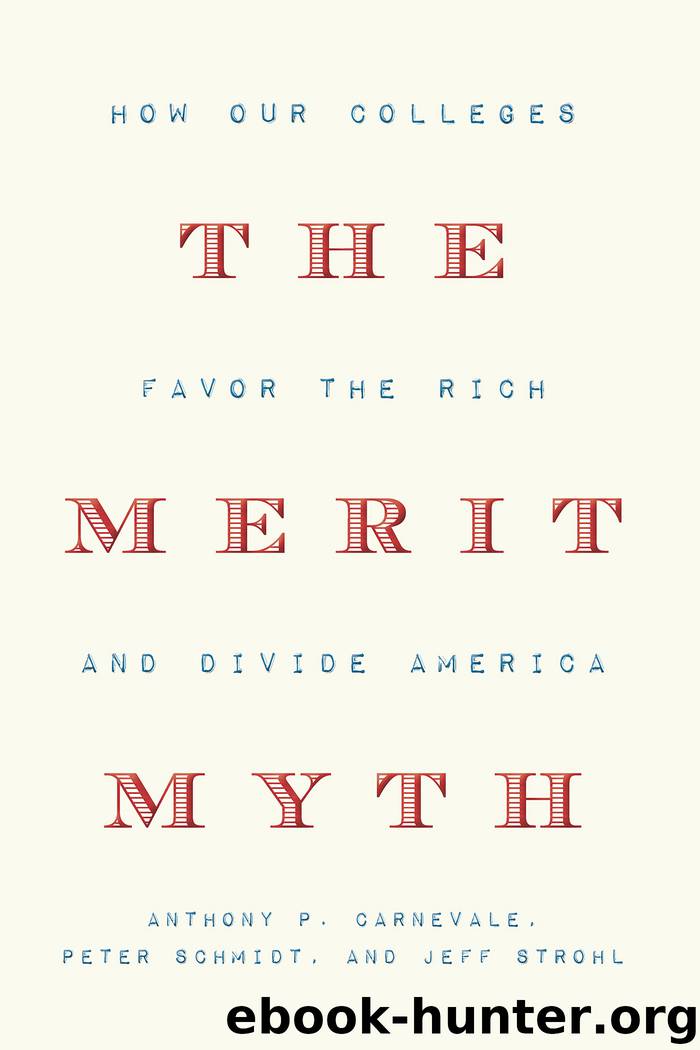The Merit Myth by Unknown

Author:Unknown
Language: deu
Format: epub
Publisher: The New Press
Published: 2020-05-14T16:00:00+00:00
Lasting Damage
Advocates of equal educational opportunity learned early on that our judicial system would be reluctant to demand any remedying of disparities in school quality. In a series of decisions dating back to the early 1970s, the U.S. Supreme Court has limited the impact of its 1954 Brown ruling and cemented into place the inequities in public school quality rooted in our nation’s history, hamstringing efforts to increase the supply of highly qualifi d black, Latino, and low-income students knocking on selective colleges’ doors.
Civil rights lawyers’ efforts to bring about the racial desegregation of public schools hit an insurmountable wall in 1974, as a result of the Supreme Court’s ruling in Milliken v. Bradley, a case involving the Detroit school system and fi y-three neighboring districts. In the lawsuit, the NAACP called for federal courts to order the State of Michigan to carry out a desegregation plan involving schools in Detroit and its suburbs, several of which stood accused of practicing housing discrimination that fostered school segregation. In rejecting that demand, the Supreme Court held that school systems that had not themselves been found guilty of racial discrimination cannot be compelled to remedy racial segregation that was not their own doing. The ruling sharpened the Supreme Court’s distinction between racial segregation that had been de jure, or required under law, and segregation that was de facto, or caused by other forces such as individual decisions. It had the effect of leaving many suburban school districts outside the reach of court-ordered metropolitan desegregation plans, and it enabled white families in big-city school districts covered by such plans to ensure their children would continue to attend overwhelmingly white schools by moving to the suburbs.39
Well before the Supreme Court’s Milliken decision, selective colleges began to claim that they could not graduate more black students simply by giving extra consideration to black applicants. Yale University, which pioneered the approach of relaxing its standards for black applicants for admission in the fall of 1966, discovered that many black freshmen that year found adjusting to life at Yale difficult. More than a third were gone by their sophomore year.40 By 1970, many leaders of selective colleges argued that their institutions had been admitting too many black students from low-income backgrounds who lacked the academic preparation to handle the demands placed on them.
Harvard’s admissions dean wrote that his institution had learned “that we cannot accept the victims of social disaster however deserving of promise they might have been, or however romantically or emotionally an advocate (or a society) might plead for them.” The share of Harvard’s black students who come from low-income families dropped from nearly 40 percent in 1969 to less than 25 percent by 1973. Other selective colleges similarly retreated from recruiting low-income black students from big cities, opting instead to compete with each other for the smaller pool of middle-class black students, whose relative advantages had left hem better prepared.41
Th s pullback by Harvard, Yale, and other elite institutions predated the realization that less-prepared students require substantial academic support to succeed.
Download
This site does not store any files on its server. We only index and link to content provided by other sites. Please contact the content providers to delete copyright contents if any and email us, we'll remove relevant links or contents immediately.
Pale Blue Dot by Carl Sagan(4984)
The Rules Do Not Apply by Ariel Levy(4935)
Goodbye Paradise(3790)
Ogilvy on Advertising by David Ogilvy(3584)
Liar's Poker by Michael Lewis(3432)
Delivering Happiness by Tony Hsieh(3408)
Into Thin Air by Jon Krakauer(3369)
Purple Cow by Seth Godin(3178)
Rogue Trader by Leeson Nick(3032)
The Social Psychology of Inequality by Unknown(3008)
The Airbnb Story by Leigh Gallagher(2834)
4 - Harry Potter and the Goblet of Fire by J.K. Rowling(2692)
The Mind Map Book by Tony Buzan(2561)
Bossypants by Tina Fey(2513)
Claridge's: The Cookbook by Nail Martyn & Erickson Meredith(2390)
All the President's Men by Carl Bernstein & Bob Woodward(2357)
Six Billion Shoppers by Porter Erisman(2287)
Master of the Game by Sidney Sheldon(2274)
Alibaba by Duncan Clark(2070)
